Unit 7 Let's volunteer ! 知识清单(含书面表达和词汇句式总结)【冀教2024版八上英语】
文档属性
| 名称 | Unit 7 Let's volunteer ! 知识清单(含书面表达和词汇句式总结)【冀教2024版八上英语】 | 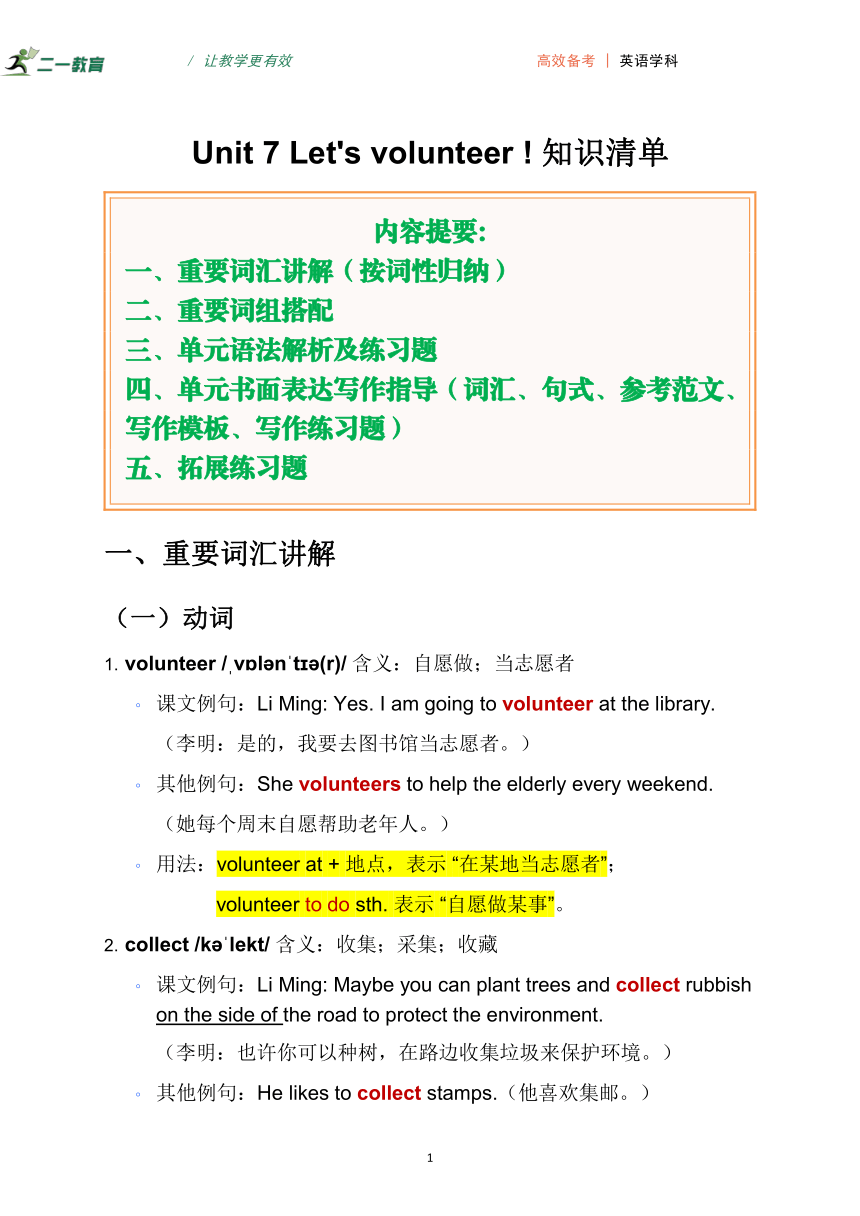 | |
| 格式 | docx | ||
| 文件大小 | 310.7KB | ||
| 资源类型 | 试卷 | ||
| 版本资源 | 冀教版 | ||
| 科目 | 英语 | ||
| 更新时间 | 2025-07-12 17:58:33 | ||
图片预览

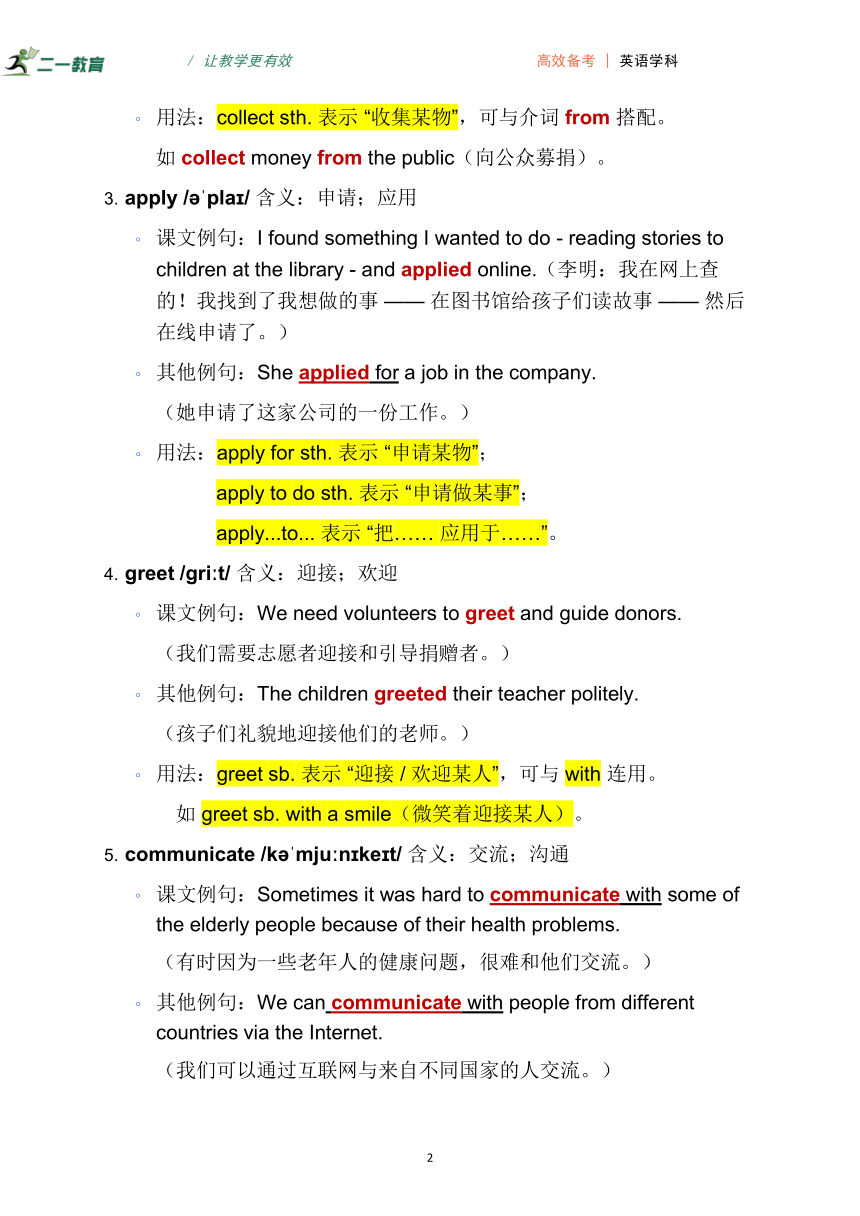
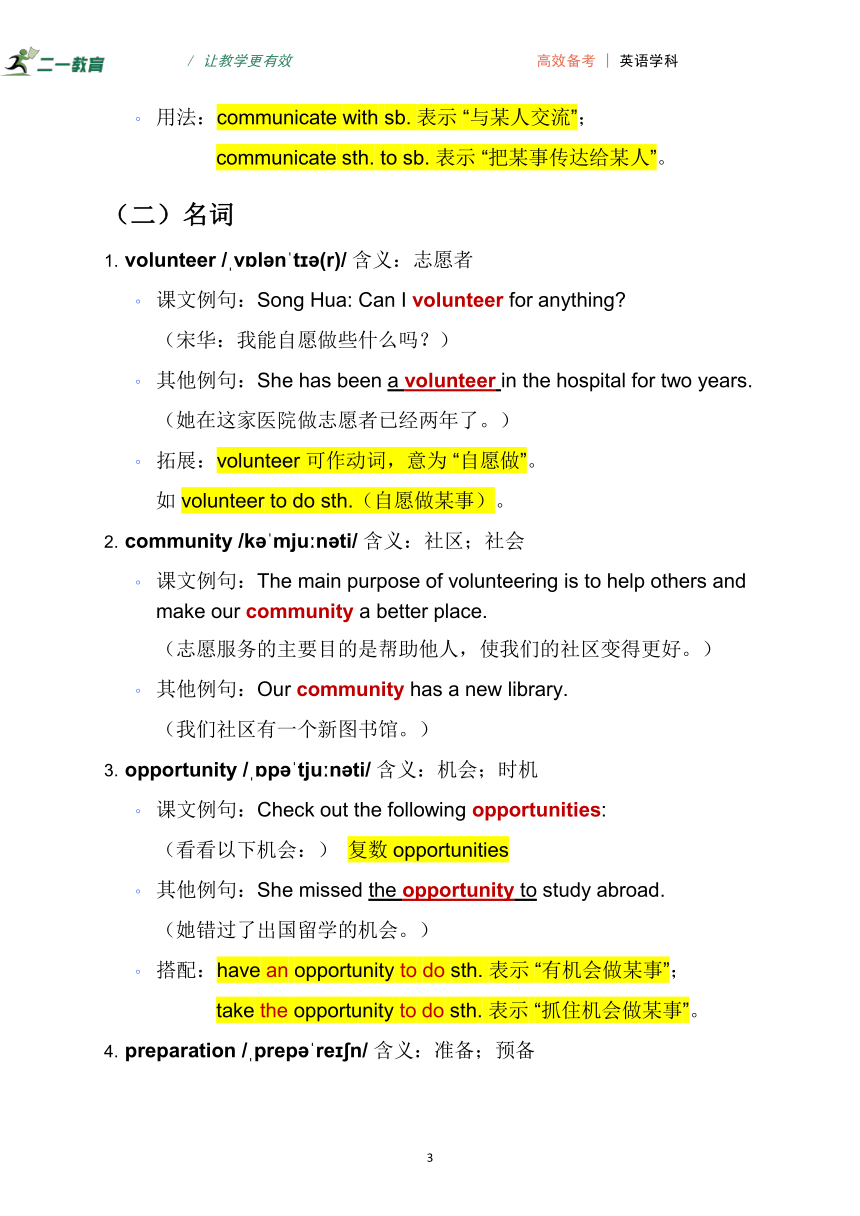
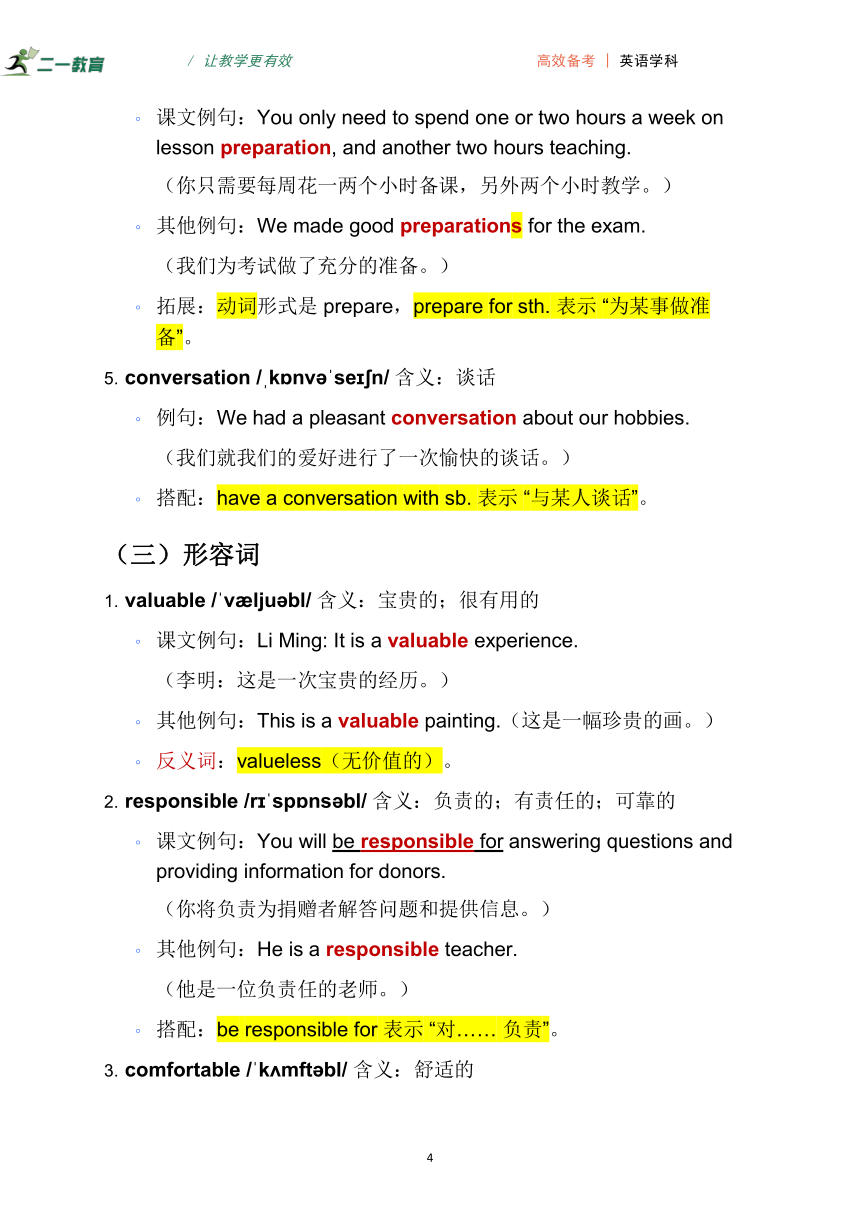
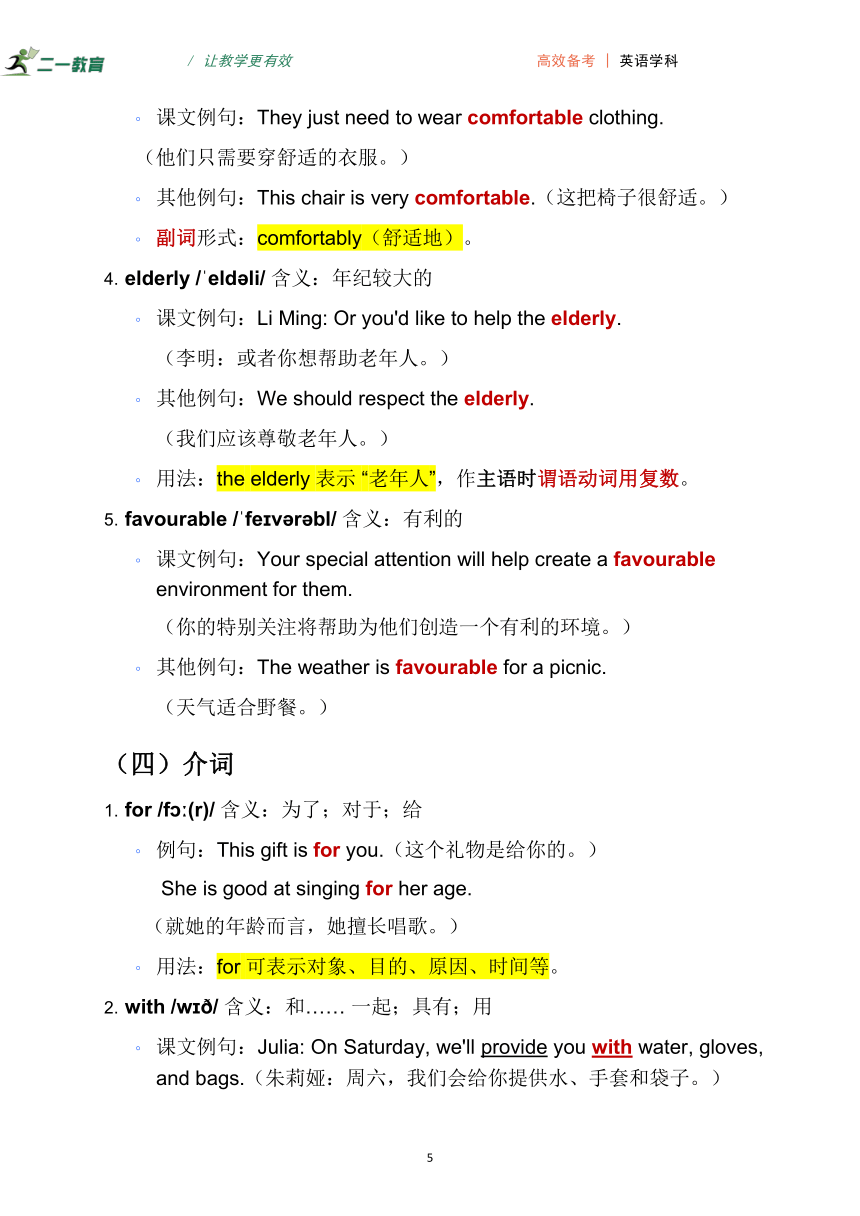
文档简介
/ 让教学更有效 高效备考 | 英语学科
Unit 7 Let's volunteer ! 知识清单
内容提要:
一、重要词汇讲解(按词性归纳)
二、重要词组搭配
三、单元语法解析及练习题
四、单元书面表达写作指导(词汇、句式、参考范文、写作模板、写作练习题)
五、拓展练习题
一、重要词汇讲解
(一)动词
volunteer / v l n t (r)/ 含义:自愿做;当志愿者
课文例句:Li Ming: Yes. I am going to volunteer at the library.
(李明:是的,我要去图书馆当志愿者。)
其他例句:She volunteers to help the elderly every weekend.
(她每个周末自愿帮助老年人。)
用法:volunteer at + 地点,表示 “在某地当志愿者”;
volunteer to do sth. 表示 “自愿做某事”。
collect /k lekt/ 含义:收集;采集;收藏
课文例句:Li Ming: Maybe you can plant trees and collect rubbish on the side of the road to protect the environment.
(李明:也许你可以种树,在路边收集垃圾来保护环境。)
其他例句:He likes to collect stamps.(他喜欢集邮。)
用法:collect sth. 表示 “收集某物”,可与介词 from 搭配。
如 collect money from the public(向公众募捐)。
apply / pla / 含义:申请;应用
课文例句:I found something I wanted to do - reading stories to children at the library - and applied online.(李明:我在网上查的!我找到了我想做的事 —— 在图书馆给孩子们读故事 —— 然后在线申请了。)
其他例句:She applied for a job in the company.
(她申请了这家公司的一份工作。)
用法:apply for sth. 表示 “申请某物”;
apply to do sth. 表示 “申请做某事”;
apply...to... 表示 “把…… 应用于……”。
greet /ɡri t/ 含义:迎接;欢迎
课文例句:We need volunteers to greet and guide donors.
(我们需要志愿者迎接和引导捐赠者。)
其他例句:The children greeted their teacher politely.
(孩子们礼貌地迎接他们的老师。)
用法:greet sb. 表示 “迎接 / 欢迎某人”,可与 with 连用。
如 greet sb. with a smile(微笑着迎接某人)。
communicate /k mju n ke t/ 含义:交流;沟通
课文例句:Sometimes it was hard to communicate with some of the elderly people because of their health problems.
(有时因为一些老年人的健康问题,很难和他们交流。)
其他例句:We can communicate with people from different countries via the Internet.
(我们可以通过互联网与来自不同国家的人交流。)
用法:communicate with sb. 表示 “与某人交流”;
communicate sth. to sb. 表示 “把某事传达给某人”。
(二)名词
volunteer / v l n t (r)/ 含义:志愿者
课文例句:Song Hua: Can I volunteer for anything
(宋华:我能自愿做些什么吗?)
其他例句:She has been a volunteer in the hospital for two years.
(她在这家医院做志愿者已经两年了。)
拓展:volunteer 可作动词,意为 “自愿做”。
如 volunteer to do sth.(自愿做某事)。
community /k mju n ti/ 含义:社区;社会
课文例句:The main purpose of volunteering is to help others and make our community a better place.
(志愿服务的主要目的是帮助他人,使我们的社区变得更好。)
其他例句:Our community has a new library.
(我们社区有一个新图书馆。)
opportunity / p tju n ti/ 含义:机会;时机
课文例句:Check out the following opportunities:
(看看以下机会:)
复数opportunities
其他例句:She missed the opportunity to study abroad.
(她错过了出国留学的机会。)
搭配:have an opportunity to do sth. 表示 “有机会做某事”;
take the opportunity to do sth. 表示 “抓住机会做某事”。
preparation / prep re n/ 含义:准备;预备
课文例句:You only need to spend one or two hours a week on lesson preparation, and another two hours teaching.
(你只需要每周花一两个小时备课,另外两个小时教学。)
其他例句:We made good preparations for the exam.
(我们为考试做了充分的准备。)
拓展:动词形式是 prepare,prepare for sth. 表示 “为某事做准备”。
conversation / k nv se n/ 含义:谈话
例句:We had a pleasant conversation about our hobbies.
(我们就我们的爱好进行了一次愉快的谈话。)
搭配:have a conversation with sb. 表示 “与某人谈话”。
(三)形容词
valuable / v lju bl/ 含义:宝贵的;很有用的
课文例句:Li Ming: It is a valuable experience.
(李明:这是一次宝贵的经历。)
其他例句:This is a valuable painting.(这是一幅珍贵的画。)
反义词:valueless(无价值的)。
responsible /r sp ns bl/ 含义:负责的;有责任的;可靠的
课文例句:You will be responsible for answering questions and providing information for donors.
(你将负责为捐赠者解答问题和提供信息。)
其他例句:He is a responsible teacher.
(他是一位负责任的老师。)
搭配:be responsible for 表示 “对…… 负责”。
comfortable / k mft bl/ 含义:舒适的
课文例句:They just need to wear comfortable clothing.
(他们只需要穿舒适的衣服。)
其他例句:This chair is very comfortable.(这把椅子很舒适。)
副词形式:comfortably(舒适地)。
elderly / eld li/ 含义:年纪较大的
课文例句:Li Ming: Or you'd like to help the elderly.
(李明:或者你想帮助老年人。)
其他例句:We should respect the elderly.
(我们应该尊敬老年人。)
用法:the elderly 表示 “老年人”,作主语时谓语动词用复数。
favourable / fe v r bl/ 含义:有利的
课文例句:Your special attention will help create a favourable environment for them.
(你的特别关注将帮助为他们创造一个有利的环境。)
其他例句:The weather is favourable for a picnic.
(天气适合野餐。)
(四)介词
for /f (r)/ 含义:为了;对于;给
例句:This gift is for you.(这个礼物是给你的。)
She is good at singing for her age.
(就她的年龄而言,她擅长唱歌。)
用法:for 可表示对象、目的、原因、时间等。
with /w / 含义:和…… 一起;具有;用
课文例句:Julia: On Saturday, we'll provide you with water, gloves, and bags.(朱莉娅:周六,我们会给你提供水、手套和袋子。)
例句:He went to the park with his friends.
(他和他的朋友们去了公园。)
She wrote the letter with a pen.(她用钢笔写了这封信。)
用法:with 可表示伴随、工具、方式等。
at / t/ 含义:在(某处);在(某时间或时刻)
课文例句:Li Ming: Yes. I am going to volunteer at the library.
(李明:是的,我要去图书馆当志愿者。)
其他例句:We have class at 8 o'clock.(我们八点上课。)
He is good at playing basketball.(他擅长打篮球。)
用法:at 可表示地点、时间、从事的活动等。
二、重要词组搭配用法解析
help out 含义:帮忙;协助
课文例句:I will read storybooks to kids. I help out once a week.
(李明:我会给孩子们读故事书。我每周帮忙一次。)
例句:She often helps out in the kitchen when her mother is busy.
(当她妈妈忙的时候,她经常在厨房帮忙。)
clean up 含义:打扫干净
课文例句:Tom: Okay. I'll help clean up the park.
(汤姆:好的。我会帮忙打扫公园。)
例句:We need to clean up the classroom before the teacher comes.
(我们需要在老师来之前把教室打扫干净。)
provide...with... 含义:为…… 提供……
课文例句:Julia: On Saturday, we'll provide you with water, gloves, and bags.
(朱莉娅:周六,我们会给你提供水、手套和袋子。)
例句:The school provides students with textbooks.
(学校为学生提供课本。)
look up 含义:查阅;查找
课文例句:Li Ming: I looked it up on the internet!
(李明:我在网上查的!)
例句:If you don't know the word, you can look it up in the dictionary.
(如果你不认识这个单词,你可以查字典。)
join in 含义:参加;加入
例句:They are playing football. Let's join in.
(他们在踢足球。我们加入吧。)
make a difference 含义:有影响;起作用
课文例句:Join our program and make a difference in their lives.
(加入我们的项目,改变他们的生活。)
例句:Even small acts of kindness can make a difference.
(即使是小小的善举也能产生影响。)
take action 含义:采取行动
课文例句:Volunteering is all about taking action to make a positive difference.
(志愿服务就是采取行动,做出积极的改变。)
例句:We need to take action to protect the environment.
(我们需要采取行动保护环境。)
care for 含义:照顾;关心;喜欢
课文例句:If you like animals, you can help care for pets at an animal shelter.
(如果你喜欢动物,你可以在动物收容所帮忙照顾宠物。)
例句:She spent years caring for her sick mother.
(她花了多年时间照顾生病的母亲。)
三、单元语法知识讲解
本单元重点学习动词不定式(to-infinitive)的用法。
含义:动词不定式由 “to + 动词原形” 构成,在句中可作主语、宾语、表语、定语、状语等。
作宾语:动词不定式常作 want, hope, plan, decide, like, need 等动词的宾语。
课文例句:
Li Ming: I am going to volunteer at the library.(李明:我要去图书馆当志愿者。)(be going to 后接动词原形,此处 volunteer 为动词,可理解为包含不定式含义)
其他例句:
I want to go to the park.(我想去公园。)
She hopes to become a teacher.(她希望成为一名教师。)
作定语:动词不定式作定语时,常放在被修饰的名词或代词后面。
课文例句:We need volunteers to greet and guide donors.
(我们需要志愿者迎接和引导捐赠者。)
(to greet and guide donors 作定语修饰 volunteers)
其他例句:I have a lot of homework to do.(我有很多作业要做。)
作状语:动词不定式作状语时,可表示目的、结果、原因等。
例句:He went to the store to buy some milk.
(他去商店买一些牛奶。)(表目的)
语法练习题
用所给动词的适当形式填空。
She plans______(visit) her grandparents next week.
They want______(join) the volunteer program.
He decided______(help) clean up the park.
I hope______(learn) more about volunteering.
We need______(prepare) for the coming event.
答案:1. to visit;2. to join;3. to help;4. to learn;5. to prepare
解析:
1. plan 后接动词不定式作宾语,所以用 to visit。
2. want 后接动词不定式作宾语,用 to join。
3. decide 后接动词不定式作宾语,用 to help。
4. hope 后接动词不定式作宾语,用 to learn。
5. need 后接动词不定式作宾语,用 to prepare。
四、本单元写作指导
(一)写作相关词汇词组
志愿服务活动:volunteering activities(志愿服务活动)、plant trees(种树)、collect rubbish(收集垃圾)、read stories to kids(给孩子们读故事)、help the elderly(帮助老年人)、teach English(教英语)、care for animals(照顾动物)、clean up the park(打扫公园)
感受与收获:happy(开心的)、proud(自豪的)、valuable(宝贵的)、meaningful(有意义的)、rewarding(有益的)、learn a lot(学到很多)、become more patient(变得更有耐心)、make friends(交朋友)
相关人员与地点:volunteer(志愿者)、elderly people(老年人)、kids(孩子们)、animal shelter(动物收容所)、library(图书馆)、park(公园)、community(社区)、nursing home(养老院)
(二)高分句式句型
I volunteered to______(activity) at/in______(place).
(我在______自愿做______活动。)
例句:I volunteered to read stories to kids at the library.
(我在图书馆自愿给孩子们读故事。)
It was a______(adjective) experience because______.
(这是一次______的经历,因为______。)
例句:It was a valuable experience because I helped others and learned a lot.
(这是一次宝贵的经历,因为我帮助了别人,也学到了很多。)
During the volunteering, I______(activity 1) and______(activity 2).
(在志愿服务期间,我______和______。)
例句:During the volunteering, I cleaned the park and helped the elderly cross the road.(在志愿服务期间,我打扫了公园,还帮助老年人过马路。)
The most enjoyable part was______(activity).(最令人愉快的部分是______。)
例句:The most enjoyable part was seeing the kids' happy faces when I read stories to them.(最令人愉快的部分是当我给孩子们读故事时,看到他们开心的笑脸。)
I learned that______(lesson).(我学到了______(道理)。)
例句:I learned that helping others can make us happy.(我学到了帮助别人能让我们快乐。)
(三)参考范文
My Volunteering Experience
Last weekend, I volunteered at the community park.
I helped collect rubbish and clean up the paths. Many people came to the park, and some joined us. We worked together happily. When we finished, the park looked very clean.
The most enjoyable part was seeing people's
happy smiles. It was a meaningful experience. I learned that even small efforts can make our community better. I plan to volunteer again next month.
(四)写作模板
My Volunteering Story
Last [time时间], I volunteered [preposition职位] [place地点].
I [activity 1活动1] and [activity 2活动2]. Some [people人] also joined me, and we [feeling during the activity活动期间感受]. When we finished, [result of the activity活动的结果].
The most [adjective形容词] part was [the most impressive thing最影响深刻的事]. It was a [adjective形容词] experience. I learned that [lesson学到的经验]. I hope to [plan for future volunteering未来志愿者的计划].
(五)写作练习题
请以 “Volunteering at the Nursing Home” 为题,写一篇不少于 60 字的短文,描述在养老院的志愿服务经历。
参考范文:
Volunteering at the Nursing Home
Last Sunday, I volunteered at the nursing home.
I talked with the elderly and read newspapers to them. They told me many interesting stories. We laughed a lot together.
The most wonderful part was seeing their happy faces. It was a great experience. I will go there again next week.
六、综合拓展练习题
用方框中所给词组的适当形式填空:
help out, look up, make a difference, care for, provide...with...
(1)The community______the homeless______food and clothes.
(2)Please______the new word in the dictionary.
(3)She often______at the animal shelter on weekends.
(4)Your kindness can______in their lives.
(5)We should______the elderly in our neighborhood.
答案:(1)provides;with(2)look up(3)helps out(4)make a difference(5)care for
解析:(1)句意为 “社区为无家可归者提供食物和衣服”,用 provide...with...,主语是第三人称单数,所以用 provides。
句意为 “请在字典中查阅这个新单词”,用 look up。
句意为 “她周末经常在动物收容所帮忙”,主语是第三人称单数,用 helps out。
(4)句意为 “你的善良能改变他们的生活”,用 make a difference。(5)句意为 “我们应该照顾小区里的老年人”,用 care for。
阅读理解:
Volunteering is a great way to help others. Many students volunteer in their free time. They may help clean the park, teach kids English, or visit the elderly. Volunteering not only helps people in need but also makes volunteers happy. It teaches them to be responsible and kind.
What do students often do when volunteering
How does volunteering help volunteers
答案:(1)They may help clean the park, teach kids English, or visit the elderly.
(2)It not only helps people in need but also makes them happy. It teaches them to be responsible and kind.
解析:(1)从文中 “They may help clean the park, teach kids English, or visit the elderly.” 可知答案。(2)从 “Volunteering not only helps people in need but also makes volunteers happy. It teaches them to be responsible and kind.” 可知答案。
Unit 7 Let's volunteer ! 知识清单
内容提要:
一、重要词汇讲解(按词性归纳)
二、重要词组搭配
三、单元语法解析及练习题
四、单元书面表达写作指导(词汇、句式、参考范文、写作模板、写作练习题)
五、拓展练习题
一、重要词汇讲解
(一)动词
volunteer / v l n t (r)/ 含义:自愿做;当志愿者
课文例句:Li Ming: Yes. I am going to volunteer at the library.
(李明:是的,我要去图书馆当志愿者。)
其他例句:She volunteers to help the elderly every weekend.
(她每个周末自愿帮助老年人。)
用法:volunteer at + 地点,表示 “在某地当志愿者”;
volunteer to do sth. 表示 “自愿做某事”。
collect /k lekt/ 含义:收集;采集;收藏
课文例句:Li Ming: Maybe you can plant trees and collect rubbish on the side of the road to protect the environment.
(李明:也许你可以种树,在路边收集垃圾来保护环境。)
其他例句:He likes to collect stamps.(他喜欢集邮。)
用法:collect sth. 表示 “收集某物”,可与介词 from 搭配。
如 collect money from the public(向公众募捐)。
apply / pla / 含义:申请;应用
课文例句:I found something I wanted to do - reading stories to children at the library - and applied online.(李明:我在网上查的!我找到了我想做的事 —— 在图书馆给孩子们读故事 —— 然后在线申请了。)
其他例句:She applied for a job in the company.
(她申请了这家公司的一份工作。)
用法:apply for sth. 表示 “申请某物”;
apply to do sth. 表示 “申请做某事”;
apply...to... 表示 “把…… 应用于……”。
greet /ɡri t/ 含义:迎接;欢迎
课文例句:We need volunteers to greet and guide donors.
(我们需要志愿者迎接和引导捐赠者。)
其他例句:The children greeted their teacher politely.
(孩子们礼貌地迎接他们的老师。)
用法:greet sb. 表示 “迎接 / 欢迎某人”,可与 with 连用。
如 greet sb. with a smile(微笑着迎接某人)。
communicate /k mju n ke t/ 含义:交流;沟通
课文例句:Sometimes it was hard to communicate with some of the elderly people because of their health problems.
(有时因为一些老年人的健康问题,很难和他们交流。)
其他例句:We can communicate with people from different countries via the Internet.
(我们可以通过互联网与来自不同国家的人交流。)
用法:communicate with sb. 表示 “与某人交流”;
communicate sth. to sb. 表示 “把某事传达给某人”。
(二)名词
volunteer / v l n t (r)/ 含义:志愿者
课文例句:Song Hua: Can I volunteer for anything
(宋华:我能自愿做些什么吗?)
其他例句:She has been a volunteer in the hospital for two years.
(她在这家医院做志愿者已经两年了。)
拓展:volunteer 可作动词,意为 “自愿做”。
如 volunteer to do sth.(自愿做某事)。
community /k mju n ti/ 含义:社区;社会
课文例句:The main purpose of volunteering is to help others and make our community a better place.
(志愿服务的主要目的是帮助他人,使我们的社区变得更好。)
其他例句:Our community has a new library.
(我们社区有一个新图书馆。)
opportunity / p tju n ti/ 含义:机会;时机
课文例句:Check out the following opportunities:
(看看以下机会:)
复数opportunities
其他例句:She missed the opportunity to study abroad.
(她错过了出国留学的机会。)
搭配:have an opportunity to do sth. 表示 “有机会做某事”;
take the opportunity to do sth. 表示 “抓住机会做某事”。
preparation / prep re n/ 含义:准备;预备
课文例句:You only need to spend one or two hours a week on lesson preparation, and another two hours teaching.
(你只需要每周花一两个小时备课,另外两个小时教学。)
其他例句:We made good preparations for the exam.
(我们为考试做了充分的准备。)
拓展:动词形式是 prepare,prepare for sth. 表示 “为某事做准备”。
conversation / k nv se n/ 含义:谈话
例句:We had a pleasant conversation about our hobbies.
(我们就我们的爱好进行了一次愉快的谈话。)
搭配:have a conversation with sb. 表示 “与某人谈话”。
(三)形容词
valuable / v lju bl/ 含义:宝贵的;很有用的
课文例句:Li Ming: It is a valuable experience.
(李明:这是一次宝贵的经历。)
其他例句:This is a valuable painting.(这是一幅珍贵的画。)
反义词:valueless(无价值的)。
responsible /r sp ns bl/ 含义:负责的;有责任的;可靠的
课文例句:You will be responsible for answering questions and providing information for donors.
(你将负责为捐赠者解答问题和提供信息。)
其他例句:He is a responsible teacher.
(他是一位负责任的老师。)
搭配:be responsible for 表示 “对…… 负责”。
comfortable / k mft bl/ 含义:舒适的
课文例句:They just need to wear comfortable clothing.
(他们只需要穿舒适的衣服。)
其他例句:This chair is very comfortable.(这把椅子很舒适。)
副词形式:comfortably(舒适地)。
elderly / eld li/ 含义:年纪较大的
课文例句:Li Ming: Or you'd like to help the elderly.
(李明:或者你想帮助老年人。)
其他例句:We should respect the elderly.
(我们应该尊敬老年人。)
用法:the elderly 表示 “老年人”,作主语时谓语动词用复数。
favourable / fe v r bl/ 含义:有利的
课文例句:Your special attention will help create a favourable environment for them.
(你的特别关注将帮助为他们创造一个有利的环境。)
其他例句:The weather is favourable for a picnic.
(天气适合野餐。)
(四)介词
for /f (r)/ 含义:为了;对于;给
例句:This gift is for you.(这个礼物是给你的。)
She is good at singing for her age.
(就她的年龄而言,她擅长唱歌。)
用法:for 可表示对象、目的、原因、时间等。
with /w / 含义:和…… 一起;具有;用
课文例句:Julia: On Saturday, we'll provide you with water, gloves, and bags.(朱莉娅:周六,我们会给你提供水、手套和袋子。)
例句:He went to the park with his friends.
(他和他的朋友们去了公园。)
She wrote the letter with a pen.(她用钢笔写了这封信。)
用法:with 可表示伴随、工具、方式等。
at / t/ 含义:在(某处);在(某时间或时刻)
课文例句:Li Ming: Yes. I am going to volunteer at the library.
(李明:是的,我要去图书馆当志愿者。)
其他例句:We have class at 8 o'clock.(我们八点上课。)
He is good at playing basketball.(他擅长打篮球。)
用法:at 可表示地点、时间、从事的活动等。
二、重要词组搭配用法解析
help out 含义:帮忙;协助
课文例句:I will read storybooks to kids. I help out once a week.
(李明:我会给孩子们读故事书。我每周帮忙一次。)
例句:She often helps out in the kitchen when her mother is busy.
(当她妈妈忙的时候,她经常在厨房帮忙。)
clean up 含义:打扫干净
课文例句:Tom: Okay. I'll help clean up the park.
(汤姆:好的。我会帮忙打扫公园。)
例句:We need to clean up the classroom before the teacher comes.
(我们需要在老师来之前把教室打扫干净。)
provide...with... 含义:为…… 提供……
课文例句:Julia: On Saturday, we'll provide you with water, gloves, and bags.
(朱莉娅:周六,我们会给你提供水、手套和袋子。)
例句:The school provides students with textbooks.
(学校为学生提供课本。)
look up 含义:查阅;查找
课文例句:Li Ming: I looked it up on the internet!
(李明:我在网上查的!)
例句:If you don't know the word, you can look it up in the dictionary.
(如果你不认识这个单词,你可以查字典。)
join in 含义:参加;加入
例句:They are playing football. Let's join in.
(他们在踢足球。我们加入吧。)
make a difference 含义:有影响;起作用
课文例句:Join our program and make a difference in their lives.
(加入我们的项目,改变他们的生活。)
例句:Even small acts of kindness can make a difference.
(即使是小小的善举也能产生影响。)
take action 含义:采取行动
课文例句:Volunteering is all about taking action to make a positive difference.
(志愿服务就是采取行动,做出积极的改变。)
例句:We need to take action to protect the environment.
(我们需要采取行动保护环境。)
care for 含义:照顾;关心;喜欢
课文例句:If you like animals, you can help care for pets at an animal shelter.
(如果你喜欢动物,你可以在动物收容所帮忙照顾宠物。)
例句:She spent years caring for her sick mother.
(她花了多年时间照顾生病的母亲。)
三、单元语法知识讲解
本单元重点学习动词不定式(to-infinitive)的用法。
含义:动词不定式由 “to + 动词原形” 构成,在句中可作主语、宾语、表语、定语、状语等。
作宾语:动词不定式常作 want, hope, plan, decide, like, need 等动词的宾语。
课文例句:
Li Ming: I am going to volunteer at the library.(李明:我要去图书馆当志愿者。)(be going to 后接动词原形,此处 volunteer 为动词,可理解为包含不定式含义)
其他例句:
I want to go to the park.(我想去公园。)
She hopes to become a teacher.(她希望成为一名教师。)
作定语:动词不定式作定语时,常放在被修饰的名词或代词后面。
课文例句:We need volunteers to greet and guide donors.
(我们需要志愿者迎接和引导捐赠者。)
(to greet and guide donors 作定语修饰 volunteers)
其他例句:I have a lot of homework to do.(我有很多作业要做。)
作状语:动词不定式作状语时,可表示目的、结果、原因等。
例句:He went to the store to buy some milk.
(他去商店买一些牛奶。)(表目的)
语法练习题
用所给动词的适当形式填空。
She plans______(visit) her grandparents next week.
They want______(join) the volunteer program.
He decided______(help) clean up the park.
I hope______(learn) more about volunteering.
We need______(prepare) for the coming event.
答案:1. to visit;2. to join;3. to help;4. to learn;5. to prepare
解析:
1. plan 后接动词不定式作宾语,所以用 to visit。
2. want 后接动词不定式作宾语,用 to join。
3. decide 后接动词不定式作宾语,用 to help。
4. hope 后接动词不定式作宾语,用 to learn。
5. need 后接动词不定式作宾语,用 to prepare。
四、本单元写作指导
(一)写作相关词汇词组
志愿服务活动:volunteering activities(志愿服务活动)、plant trees(种树)、collect rubbish(收集垃圾)、read stories to kids(给孩子们读故事)、help the elderly(帮助老年人)、teach English(教英语)、care for animals(照顾动物)、clean up the park(打扫公园)
感受与收获:happy(开心的)、proud(自豪的)、valuable(宝贵的)、meaningful(有意义的)、rewarding(有益的)、learn a lot(学到很多)、become more patient(变得更有耐心)、make friends(交朋友)
相关人员与地点:volunteer(志愿者)、elderly people(老年人)、kids(孩子们)、animal shelter(动物收容所)、library(图书馆)、park(公园)、community(社区)、nursing home(养老院)
(二)高分句式句型
I volunteered to______(activity) at/in______(place).
(我在______自愿做______活动。)
例句:I volunteered to read stories to kids at the library.
(我在图书馆自愿给孩子们读故事。)
It was a______(adjective) experience because______.
(这是一次______的经历,因为______。)
例句:It was a valuable experience because I helped others and learned a lot.
(这是一次宝贵的经历,因为我帮助了别人,也学到了很多。)
During the volunteering, I______(activity 1) and______(activity 2).
(在志愿服务期间,我______和______。)
例句:During the volunteering, I cleaned the park and helped the elderly cross the road.(在志愿服务期间,我打扫了公园,还帮助老年人过马路。)
The most enjoyable part was______(activity).(最令人愉快的部分是______。)
例句:The most enjoyable part was seeing the kids' happy faces when I read stories to them.(最令人愉快的部分是当我给孩子们读故事时,看到他们开心的笑脸。)
I learned that______(lesson).(我学到了______(道理)。)
例句:I learned that helping others can make us happy.(我学到了帮助别人能让我们快乐。)
(三)参考范文
My Volunteering Experience
Last weekend, I volunteered at the community park.
I helped collect rubbish and clean up the paths. Many people came to the park, and some joined us. We worked together happily. When we finished, the park looked very clean.
The most enjoyable part was seeing people's
happy smiles. It was a meaningful experience. I learned that even small efforts can make our community better. I plan to volunteer again next month.
(四)写作模板
My Volunteering Story
Last [time时间], I volunteered [preposition职位] [place地点].
I [activity 1活动1] and [activity 2活动2]. Some [people人] also joined me, and we [feeling during the activity活动期间感受]. When we finished, [result of the activity活动的结果].
The most [adjective形容词] part was [the most impressive thing最影响深刻的事]. It was a [adjective形容词] experience. I learned that [lesson学到的经验]. I hope to [plan for future volunteering未来志愿者的计划].
(五)写作练习题
请以 “Volunteering at the Nursing Home” 为题,写一篇不少于 60 字的短文,描述在养老院的志愿服务经历。
参考范文:
Volunteering at the Nursing Home
Last Sunday, I volunteered at the nursing home.
I talked with the elderly and read newspapers to them. They told me many interesting stories. We laughed a lot together.
The most wonderful part was seeing their happy faces. It was a great experience. I will go there again next week.
六、综合拓展练习题
用方框中所给词组的适当形式填空:
help out, look up, make a difference, care for, provide...with...
(1)The community______the homeless______food and clothes.
(2)Please______the new word in the dictionary.
(3)She often______at the animal shelter on weekends.
(4)Your kindness can______in their lives.
(5)We should______the elderly in our neighborhood.
答案:(1)provides;with(2)look up(3)helps out(4)make a difference(5)care for
解析:(1)句意为 “社区为无家可归者提供食物和衣服”,用 provide...with...,主语是第三人称单数,所以用 provides。
句意为 “请在字典中查阅这个新单词”,用 look up。
句意为 “她周末经常在动物收容所帮忙”,主语是第三人称单数,用 helps out。
(4)句意为 “你的善良能改变他们的生活”,用 make a difference。(5)句意为 “我们应该照顾小区里的老年人”,用 care for。
阅读理解:
Volunteering is a great way to help others. Many students volunteer in their free time. They may help clean the park, teach kids English, or visit the elderly. Volunteering not only helps people in need but also makes volunteers happy. It teaches them to be responsible and kind.
What do students often do when volunteering
How does volunteering help volunteers
答案:(1)They may help clean the park, teach kids English, or visit the elderly.
(2)It not only helps people in need but also makes them happy. It teaches them to be responsible and kind.
解析:(1)从文中 “They may help clean the park, teach kids English, or visit the elderly.” 可知答案。(2)从 “Volunteering not only helps people in need but also makes volunteers happy. It teaches them to be responsible and kind.” 可知答案。
同课章节目录
